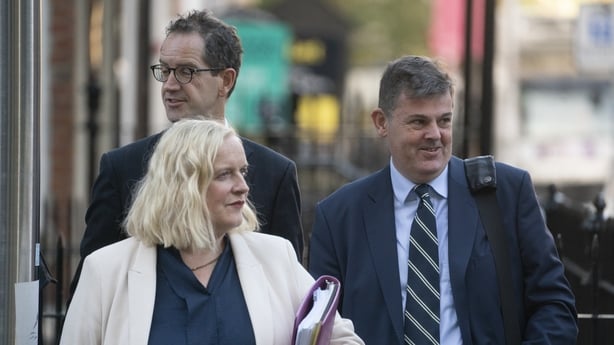RTÉ will become insolvent by early spring if the Government does not provide additional funding, Director General Kevin Bakhurst has told the Dáil Public Accounts Committee.
The national broadcaster is facing a loss of up to €12m this year and has already used up almost two thirds of its €100m available credit, the committee heard.
A cash reserve of €68m includes roughly €20m due to Revenue over incorrectly treating workers as self-employed and denying them benefits, an executive revealed.
TV licence revenue is down 30%, and the accumulated loss over this year and next is estimated to hit €61m, Mr Bakhurst said.
RTÉ Director General Kevin Bakhurst has told PAC that the trend of licence fee payments is down 30%, adding that the payments last week were down 39% | Read more: https://t.co/f0CEwvYR1Y pic.twitter.com/ryMoCW9BRc
— RTÉ News (@rtenews) October 12, 2023
Underlining the necessity of securing Government funding, he said that licence fee payments were down by 39% last week.
"If we didn't get this cash, we would run out of cash, that's for sure," he said. "It is worrying."
The Government has said that no extra funding will be given until RTÉ demonstrates a commitment to cost cutting in its strategic review, which is expected soon.
Commercial revenue at the national broadcaster is also down, although just by "single percentage points", Head of Strategy & Commercial Compliance Conor Mullen said.
Asked how much this was costing RTÉ, he replied: "There's millions".
But any move to find a solution in the complete sale of the RTÉ campus in Donnybrook is now unlikely, Mr Bakhurst said, in part because repurposing the site would present challenges and significant costs.

'Continued frustration'
Several committee members pressed RTÉ to give it a note from a meeting at the centre of the controversy over payments to Ryan Tubridy, and which took place between former Director General Dee Forbes and Mr Tubridy's agent, Noel Kelly, in May 2020.
Labour TD Alan Kelly warned that PAC would seek to compel RTÉ to provide the document, adding that if the issue ended up in the courts Mr Bakhurst's position would become untenable.
Fine Gael's Colm Burke insisted that releasing the note was essential to rebuilding trust with the public, and that it posed no "risk that it might create further claims" against RTÉ.
"You have all of the information" relating to that meeting, RTÉ's Head of Legal Affairs Paula Mulooly insisted, repeating RTÉ's contention that the note could not be released for legal reasons.
Green Party TD Marc Ó Cathasaigh shook his head, saying that the refusal caused "a continued frustration on the part of this committee" which is simply "looking for the pieces of the jigsaw".
"Some of them are getting stuffed down the back of the couch," he said.
Mr Bakhurst said that RTÉ had cooperated by providing thousands of documents, and pointed to "complete new procedures in place" around presenter contracts.
But he said that he had to protect the editorial integrity and independence of the organisation.
Alan Kelly has said PAC would seek to compel RTÉ to provide a note related to a 2020 meeting between Dee Forbes and Noel Kelly, adding that if this issue ends up in the courts, Mr Bakhurst's position would not be tenable | Read more: https://t.co/f0CEwvYR1Y pic.twitter.com/5ReBKnR4QE
— RTÉ News (@rtenews) October 12, 2023
'Painful'
The RTÉ DG also revealed that there is "a significant cost" to the reviews under way, with RTÉ "allowing €250,000 a month for these ongoing reports".
"Which is very painful when you're in our financial position," he told Fianna Fáil's Corman Devlin.
A review into RTÉ by McCann Fitzgerald is now expected "by the end of this month", he said, after sharing his disappointment that it had not been delivered last month, as he had requested.
Asked if the departure of Chief Financial Officer Richard Collins from RTÉ this week was amicable, Mr Bakhurst said that "it was professional".
"There is an agreement we reached, his legal team were present," he said, after confirming that no legal papers have been served over the matter.
An update of a review of RTÉ's 2017 and 2021 voluntary exit schemes has been forwarded by RTÉ to the PAC.
Asked if there are voluntary exit packages currently in place for executives, Mr Bakhurst said: "They're not necessarily voluntary".
"When you try to change an organisation and you need to exit people there are a number of ways you can do it," he told Committee Chair Brian Stanley of Sinn Féin.
"They're not always voluntary, and sometimes they involve exit payments."
Is this a question of asking someone to leave and giving them a "good financial package", Mr Stanley asked.
Mr Bakhurst replied: "Not necessarily a good one".
